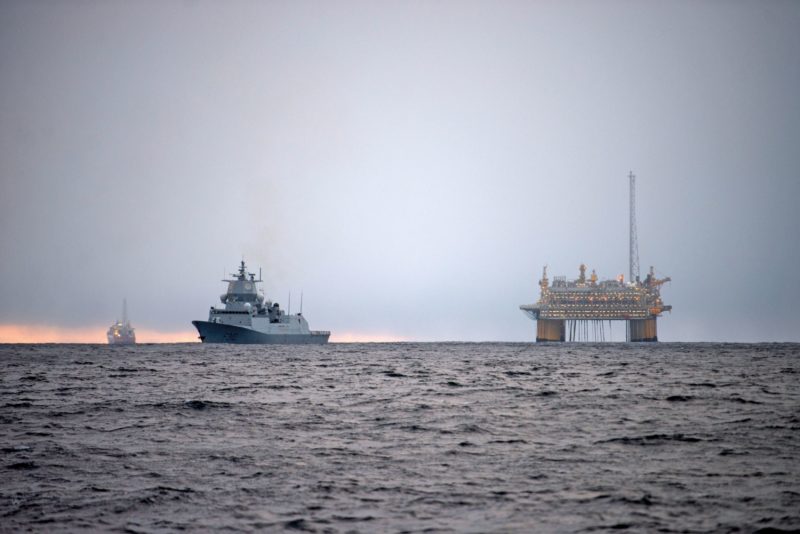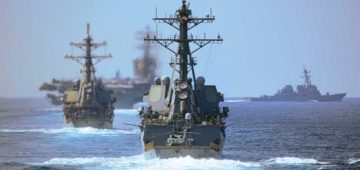
If rhetoric is anything to go by there seems to be a growing fear in Western corridors of power that we are accelerating towards a major East-West struggle, possibly even spanning the globe.
British Secretary of State for Defence Grant Shapps highlighted as much in a Lancaster House, London speech last month (Jan). He said that “the era of the peace dividend is over.” Now the West must deal with potential foes China, Russia, Iran and North Korea. Unlike the rational actors of the Cold War potential foes are “far more unstable, and irrational”, according to Shapps, but also co-operating with each other.
The Iranians, for example, have formed an Axis of Resistance against a Western military presence in the Middle East while also selling drones to Moscow, which are used to attack Ukrainian towns and cities.
North Korea is providing millions of artillery rounds to the Russians, while no doubt hoping for assistance with its nuclear-armed submarine programme in return. Russia and North Korea are more directly aggressive. Witness the former’s war in Ukraine and the latter’s habit of firing numerous missiles far out to sea to frighten neighbours Japan and South Korea. Iran combines calculated, lethal use of proxy armies Hezbollah, Hamas and the Houthis with its own low level harassment of the West. China is in a whole different league, playing the long game for regional military and worldwide economic domination. Despite its sometimes fiery rhetoric and assistance for bad actors via arms supplies it is primarily seeking to subvert the global system for its own economic betterment.
However, the prospect of Beijing ordering an invasion of Taiwan, to unite it with communist mainland China, is always there.
In his speech Shapps warned:
“In five years’ time we could be looking at multiple theatres involving Russia, China, Iran and North Korea.” Whether he meant hot conflict or a new Cold War – and the last one burned hot sometimes – is not quite clear. But Russia’s war in Ukraine, and what comes next, looms large in the minds of Western defence planners. The prospect of a direct NATO versus Russia conflict surely dominates their future contingency planning. Speaking after an Alliance meeting in Brussels last month (Jan), Chair of the NATO Military Committee Admiral Rob Bauer (of the Royal Netherlands Navy) said: “We have to realise it’s not a given that we are in peace. And that’s why [NATO forces] are preparing for a conflict with Russia.”
He added that a conflict could come within 20 years.
Similarly German Defence Minister Boris Pistorius, observed: “We hear threats from the Kremlin almost every day … so we have to take into account that Vladimir Putin might even attack a NATO country one day.” He earlier reportedly told the newspaper ‘Der Tagesspiegel’ that war could occur within “a period of five to eight years.”
New NATO member Sweden is equally concerned. Addressing a security conference in January, Sweden’s Foreign Affairs minister Tobias Billstrom said: “We must be realistic and assume – and be prepared for – a drawn-out confrontation that will continue for as long as Russia flagrantly breaches the UN Charter and the European security order.”

At the same conference, Swedish defence minister Pal Jonson said his nation finds itself “in serious times and that it is high time to focus our efforts and rapidly build a stronger total defence.”
Whereas Sweden has maintained a reasonable level of defence spending, and front line NATO state Finland has a high level of readiness, the actions of some Alliance members fail to match such rhetoric. Germany’s defence procurement and the rundown state of its military has been embarrassingly clear for some time. And while Grant Shapps has praised the Royal Navy in particular, for its stabilising presence globally and operations to defend Britain’s interests and the rules based order, the UK Armed Forces are in a dire state (see commentary on P16 of the March 2024 issue). His London speech ticked many of the right boxes, but coming against the backdrop of more potential cuts to the Royal Navy it didn’t match the grim reality. And the post-1991 ‘peace dividend’ era – in which the UK and other Western states could safely minimise defence spending – actually ended some years ago. Some would say the world was given a big wake-up call via the Russian annexation of the Crimea in 2014 and its invasion of eastern Ukraine the same year. Some in the West stayed asleep and have not yet shaken off their torpor.
TEN years later it is time for the West to properly wake up. Admiral Bauer last month also warned that NATO nations, their defence industries and people, need to adjust their thinking to “an era in which anything can happen at any time, an era in which we need to expect the unexpected, an era in which we need to focus on effectiveness in order to be fully effective.”
Bauer said that NATO military transformation is making progress but member states’ wider societies do not yet understand it is more than the military that has to change in order to prepare for war.
“It is the whole of society that will [need to] get involved whether we like it or not,” he said. Bauer recommended that civilians prepare themselves at the most basic level, with people getting in bottled water supplies, buying radios with batteries and also flashlights. Such things are, according to the admiral, essential “to make sure you can survive the first 36 hours. Things like that. Simple things. But it starts there.” Furthermore, Admiral Bauer warned: “Not everything is going to be hunky-dory in the next 20 years. I am not saying it is going wrong tomorrow, but we have to realise it’s not a given that we are in peace. And that’s why we have plans. That’s why we are preparing for a conflict with Russia and the terror groups if it comes to it, if they attack us. We are not seeking any conflict, but if they attack us we have to be ready.”
NEVER in the almost 26 year history of this magazine have we heard words quite as blunt as that from a top NATO admiral, taking things down to the most basic level of preparedness for us all. We are all well advised to hoist his sage advice aboard, but even so we should not panic.
Western nations must continue supporting Ukraine’s fight against Russia, but also seriously rearm themselves to face down the threats to come after that conflict’s end.
If we do so, then WW3, as the tabloids like to call it, may yet be avoided. If Russia fails in Ukraine and NATO grows even stronger with due urgency, the lesson to totalitarians who seek to tear down Western liberal democracy will be that theirs is a futile project. And so, it is not worth Russia-style military gambits to seize territory or using proxies like the Houthis to disrupt global maritime trade for their sponsor’s own broader nefarious ends.






Comments
Sorry, comments are closed for this item